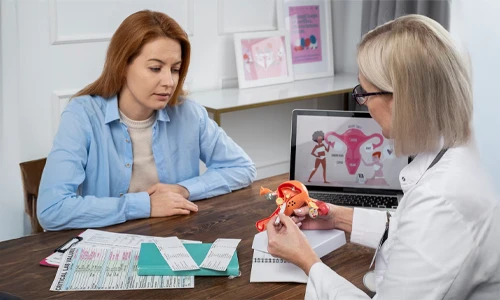Let’s get real: sitting in the exam room, in those paper shorts, you might feel nervous or unsure what to say. But guess what? Your gyno is there for you, and the visit works best when you’re prepared. In fact, by knowing the top questions to ask a gyno, you can turn a routine check-up into a powerful step toward owning your health.
Let’s dive into how to walk in confidently, what to bring, and which topics you can’t skip.
1. Come Prepared — Your Body and History Matter

Before you even ask your first question, prepare by gathering:
- A list of medications, supplements, and any past surgeries or health issues.
- Your menstrual history: when it started, how long, how heavy, any spotting or pain.
- Your sexual & relationship history: partners, any STI concerns, birth control use. It might feel awkward, but it’s normal and helpful.
- Your family health history: fibroids, breast cancer, early menopause — all of it affects your gyno-care.
Bringing this information keeps the conversation focused and meaningful. Your gyno wants honesty, not perfection.
2. The Essential Questions to Ask Gyno

Below are topics you don’t want to skip — they’re relevant to any woman at any age.
Periods & Cycles
- “Is my bleeding, cramping or spotting normal for my age?” If you’re changing pads every hour or skipping cycles, ask why.
- “Can you explain what my cycle is doing and what each phase means for births, health or PMS?”
Sexual & Reproductive Health
- “What do I need to know about birth control, safe sex and STI screening given my lifestyle?” The right form isn’t one-size-fits-all.
- “I’m planning (or not planning) pregnancy — what should I do now to prepare or delay?”
Symptoms You Might Ignore
- “I’ve noticed [odor/discharge/pain during sex/leaking urine] — when is this normal and when is it something to check?” Many women skip these topics, but they matter.
- “How can I tell the difference between normal vaginal changes and something like an infection?”
Lifestyle & Future Health
- “Given my stress/sleep/diet/how I exercise, what should I be doing differently for my gyno- health?”
- “What screenings or tests do I need and when?” Your gyno can help you tailor the plan.
3. How to Ask With Confidence

- Remember: your gyno has heard it all. Anything you feel awkward about is part of their job.
- Write your questions down ahead of time — those sticky notes or phone notes help when your mind goes blank.
- Use “I” statements: “I’ve been feeling…”, “I want to know…” rather than “You should…”
- If you feel rushed or dismissed, speak up: “Can we go slower?” You are your own best advocate.
- Ask for clarification if you don’t understand. No question is too small.
4. The Visit Doesn’t End in the Exam Room

- After your appointment, review notes. Did you understand what was said? If not, call or message your provider.
- Set follow-up reminders: next exam in X months, test result review, birth control check-in.
- Keep tracking your own body: patterns of pain, mood, discharge, cycles — these help your next visit be even more useful.
- You don’t need to wait for a symptom crisis to book an appointment. Preventive care is powerful.
5. Bonus: Questions Our Mothers May Not Ask
- “What’s happening hormonally with my mood, sleep, skin right now?”
- “Am I too young or too old for this method or test?”
- “Can we treat sex-related pain or low libido — and sooner, please?”
- “Given my family history, what steps should I begin now?”
These are rights, not privileges. Knowing better means you’ll feel better.
Quick Checklist of Things Every Woman Should Tell Her Gyno

- Number of sexual partners
- Any instances of unprotected sex
- Difficulty with orgasm or sexual satisfaction
- Bleeding after sex
- Changes in period (heavier/lighter/irregular)
- Pain during intercourse
- Medications and supplements being taken
- History of sexual abuse or trauma
- Unusual vaginal odor or discharge
- Plans (or concerns) about pregnancy and fertility
- Sleep or menstrual changes that could suggest perimenopause
FAQs — Talking to Your Gynecologist

1. What should I bring to my gynecologist appointment?
Bring your medical history (periods, surgeries, medications), any symptoms you’re worried about, your list of questions, and your insurance or identification details.
2. Is it okay to talk about painful or heavy periods?
Absolutely — heavy or painful periods can signal conditions like fibroids or endometriosis. Your gyno needs to know to make an accurate diagnosis.
3. Do I need to reveal my sexual history at the appointment?
Yes, it’s helpful. Information about past partners, STIs, birth control use, and sexual activity helps your doctor assess your risk and personalize your care.
4. What vaginal discharge or odor should I mention?
If the discharge changes in color, consistency, or smell — especially if it’s fishy or foul-smelling — mention it. It could signal an infection or imbalance.
5. How should I approach questions about birth control or planning for pregnancy?
Be clear about your current or future goals (wanting kids, avoiding pregnancy, switching methods). Your gyno can help you choose the best options for your situation.
6. My pelvic area hurts during exercise or sex — should I mention it?
Yes. Pelvic pain, pain during sex, or discomfort during movement help your doctor determine issues like pelvic floor dysfunction or other conditions.
7. If I’m nervous or embarrassed, what should I do?
That’s completely normal. Let your doctor know you’re anxious, ask what to expect before exams, and know you can request a female provider or a chaperone.
8. How often should I visit a gynecologist if I’m healthy?
Generally, once a year for a well-woman exam is recommended. If you have new symptoms, heavy periods, or changes in health, you might need more frequent visits.
9. Should I mention lifestyle concerns — like diet, smoking or stress?
Yes. Your lifestyle affects gynecologic health. Discuss smoking, drinking, stress, weight, exercise and such — your physician can give tailored support.
10. What if I’m seeing a male gynecologist and don’t feel comfortable?
It’s ok to speak up. You can ask for a female provider, bring a trusted friend or family member, or request that your partner or friend stay in the room. Your comfort matters.
Walking into your gyno’s office prepared isn’t about being perfect — it’s about being heard, respected and proactive. Use these topics and questions to ask gyno as your map. Your health is too important to leave unsaid. You’re worth the clarity, the questions, the care.













